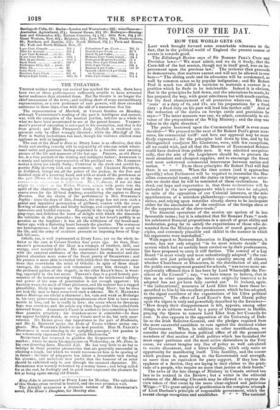THE THEATRES.
THOUGH neither novelty nor revival has marked the week, there have been two or three performances sufficently notable to have attracted better audiences than attended them. But the theatre is no longer the chief amusement of the town ; and nothing short of some extraordinary representation, or a new performer of rare powers, will draw crowded audiences in these days, even with the aid of a numerous free list.
The representation of Macbeth, at Covent Garden on Monday, although VANDENHOFF'S reading of the part is intelligent and earnest, was, with the exception of the musical portion, inferior as a whole to What we have been accustomed to see at the patent houses. VANDEN- HOFF'S power of execution is not equal to his conception, and that is far from grand; and Miss PHILLIPS'S Lady Macbeth is rendered con- spicuous only by effort wrongly directed ; while the Macduff of Mr. PrrLr is Surrey melodrama run mad, though his violence elicited some applause as well as laughter.
The cast of the Road to Ruin at Drury Lane is so effective, that this , lively and sterling comedy will be enjoyed by all who can relish whole- some satire and generous feeling expressed in a forcible and amusing picture of the life and manners of the last age. PHELPS, as old Dorn- ton, is a true portrait of the doating and indulgent father ; ANDERSON is a manly and spirited representative of his prodigal son ; Mr. LAMBERT makes a stern yet kindly Sulky; Commori is the sleek and sordid hy- pocrite Silky in every look and movement ; and CHARLES Mem:Ewe, as Goldfinch, brings out all the points of the jockey, in the free and finished style of a knowing hand, and with as much of the gentleman as the part allows of: his description of the race carries one on to the course—,ite exat enient is infections. Mrs. C. JONES, if not all that might be e jibed as the Widow Warren, enters with gusto into the spirit of the character ; though her version is a trifle too broad and coarse even for the ill-bred demirep, considering she aspires to Harry Dornton. But the charm of the performance is Mrs. STERLING'S Sophia : since the days of Mrs. JORDAN, the stage has not seen such a genial and impulsive personation of girlhood, wanton with the over- flowing of animal spirits and kindly feelings, and coquettish out of pure innocence and bashful coyness. Exquisite is the toying with her skip- ping-rope, and delicious the burst of delight with which she discovers the valentine in the plumcake : the crying at her lover's perfidy is as genuine as the laughter ; it has all the wilfulness of the bread-and- butter age, with a fluttering heart beneath the pinafore. The costumes are heterogeneous ; but the scene outside the tennis-court is acted to the life, and the army of creditors presents an imposing force of Eng- lish bill-men.
Othello, too, is well represented at Drury Lane, yet on the whole in- ferior to the cast at Covent Garden four years ago. As then, Mee- READY'S personation of the Moor is a triumph of intellect, skill, and energy, over natural defects. His constrained bearing is at variance with the external attributes of the character ; his unmusical and dis- jointed elocution mars some of the finest poetry of SHARSPERE ; and
his passion is more akin to excited irritability than the tumultuous emo- tions that overwhelm the mind of Othello : in spite of these disad- vantages, his earnestness and vehemence carry him through ; but
the profound pathos of the tragedy, in the elder Knew's time, is want- ing, especially in the last scene. PHELPS'S 'ago is a good homely per-
sonation of the honest-seeming villain, though the intellectual subtlety and power of the man of penetration is not enough apparent : his knavery wears the mask of blunt plainness, and his manner has a rugged plausibility, likely to impose on the unsuspecting Moor ; but he does
not look the man to have conceived such a soheme. Mr. C. Mernswa makes Roderigo too trivial a character ; for, vain and weak as Roderigo
is, his very perseverance and unscrupulousness show him to have some mettle in him, and he is really in love : the scene where he threatens 'ago was overdone, and the comic cry when Iago stabs him called forth
deserved hisses. ANDERSON'S Cassio is mellowed into something better
than passable propriety : his drunken-scene is admirable—he does not appear foolishly drunk, as every Cassia used to do, but only quar-
relsome. Mr. ELTON gives due importance to the part of Brabantio, and Mr. G. BENNETT spoke the Duke of Venice without undue em- phasis. Mrs. WARNER'S Emilia is the best possible. Miss H. FAIIC1T'S Desdemona is most winning in the sprightly passages ; her passion is too vehemently expressed for the "gentle Desdemona." Bumasrons has returned to gladden the frequenters of the Hay- market ; where he made his appearance on Wednesday, as Mr. Dove, in his own divertiug farce Married Life. He has very little to do but to
indulge in those peculiar pleasantries that are generally successful in eliciting a laugh, but which we would recommend him to be sparing of in future : the taste of playgoers has taken a favourable turn during his absence, and audiences now prefer that the humour of an actor should be exhibited only in and through the assumed character. Mr. BIICKSTONE was warmly welcomed by a scanty house ; and being called for at the end, he feelingly and in good taste expressed the pleasure he felt at being again among old friends.


























 Previous page
Previous page